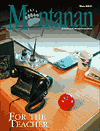
Winter 2001
CONTENTS
Managing the Mountain
Teachers Who Change Lives
AROUND THE OVAL
LETTERS TO THE EDITOR
UM FACES
SPORTS
CLASS NOTES
ALUMNI NOTES
Contact Us
About the Montanan
PAST ISSUES
 Teachers Who Change Lives Teachers Who Change Livesby Robert Birk, Ocala, Florida
Dean Arthur Stone, journalism by Robert Birk, Ocala, Florida 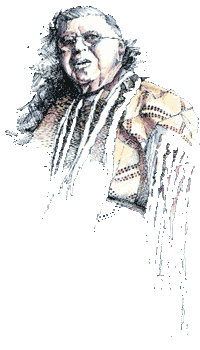
I must have been the last student Dean Stone had before retiring in 1942. I had recently moved to Montana. The war had just started, and I was anxious to get my education behind me while I could, so I was attending summer school. Apparently, I was the only one foolish enough to register for an introduction to journalism class in a summer semester. I was told to report to Dean Stone. As I knocked on his open door, he was leaning back in his chair reading. He looked up with a startled look and answered "Yesssss," a guarded, quizzical tone in his voice. I explained that I was a new student and that I had been assigned to his class. The unhappy expression told me the whole story at a glance: "Oh my God, do I have to put up with another one of these stupid freshman? — and after all these years . . . !?" He was retiring at the end of the summer session and was apparently hoping that his long, illustrious career would end quietly. I stood there, waiting for him to say something as he looked back down at the papers in front of him. He seemed to be in deep concentration. Finally, he told me to come in and sit down in a chair in front of his desk. He took a long hard look at me. I was beginning to feel that there must be something contemptuous about me. Still, I understood that there were all kinds of renegades running around there. Finally, he said, "I guess the best way to start is for me to tell you a story and you can write it up, and we'll see what you can do." He proceeded by telling me in great detail an old Indian fable, supposedly told to him by an Indian half-breed friend by the name of McDonald, who had surprised him in Ravalli as he was bathing his hot feet in a cool creek. He was waiting for a train after a long, hot, dusty, stagecoach ride from Hot Springs. He said that he had been trying to get McDonald to tell him the fable for years. Now, the bushes suddenly parted and McDonald was there to tell him the fable. The story was about two friends, Mr. Fox and Mr. Coyote. Mr. Fox had been in Spokane and had gotten drunk, landing in jail. Mr. Coyote had gone there and gotten him out. It evidently hadn't been the first time, as Mr. Coyote felt the need to take Mr. Fox out on the trail going east, telling him that he had to avoid all temptation, and always to keep his eyes straight ahead. Finally, after a day on the trail, Mr. Fox became bored and as he was passing the meadow below Evaro Pass, he noticed some Indian maidens dancing below. Dean Stone would stop from time to time and ask me if I knew where that was, and I assured him I did. To make a long story short, Mr. Fox went down and was dancing with the Indian maidens. They resented his intrusion, and as they danced in a circle, getting ever closer to a creek, they pushed him in. Mr. Coyote arrived just in time to save him. Exasperated, Mr. Coyote again took Mr. Fox up and started on the dreary trail east. However, Mr. Fox was bent on revenge, and after Mr. Coyote was gone, he returned to the meadow to resume dancing with the Indian maidens. When they weren't looking he set fire to the grass, burning them up. Remorseful, he took a little of the ashes and scattered them over the water in the creek. The ashes caused the water to bubble and that was where it happened. They called it Missoula, the canyon of the bubbling creek. Joseph 'Smoky Joe' Kramer, botany by Tony Carlson '62, M.S. '64, White Bird, Idaho  That spark that once or twice you feel
That spark that once or twice you feelfrom teachers who you know are real lasts at least ten years — I know. I still feel Smoky Joe. He lost sleep when students slipped. Some other teachers laughed and gripped their research grants and grabbed graduation products to lengthen lists of publication. From microscope to microscope to see a live green cell of Elodea, in the lab he'd often flit saying, "Py Got, beautiful, ain't it?" He'd always walk the class around to check the new things that he found around the base of Sentinel. I still remember well the day he snapped a fresh pine twig to show us meristem at work, and big as life addressed that tree, "Pinus, you must pardon me for hurting you this spring. I gotta teach dese dumb kids someting." When Hellgate didn't blow too cold, he would run the track before I'd even shaved. In winter no one thought it odd to see an old man shooting baskets in the gym. Sometimes he'd mention God. He was an environmentalist before we knew enough to condemn him for it. He taught us a personal kind of ecology — not from ecosystematics or fear, but from loving all of life. Things just seemed to fit for him. I think he was a pacifist. He seemed alone. Maybe no one really knew him. Hell, I know I didn't. Yet now I find that I loved him. By Dan Block '53, M.S. '55, Ed.D '73, Dillon At times Dr. Joe Kramer would grow impatient when some of the class would not take things as seriously as he thought they should. And, very rarely, he would even put on a temper tantrum in order to get a point across. On an ecology class field trip one day, a few of the students were not paying attention. After a few polite requests to stop the distractions, he finally blew up. He yelled, stomped his felt hat on the ground, and finally tossed it high in the air, saying "That's it. We are done for today. Class dismissed." Joe picked up his hat and we headed back to campus. On the way, I walked beside him. He was silent for a while, then spoke to me more like a fellow man than a student, saying, "I hope you didn't take me seriously, Dan. I love the teaching but it is keeping up the act that sometimes wears me out." Walter King, English by David Ficek '83, Billings 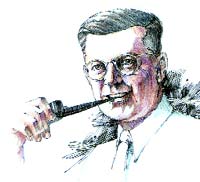
When I signed up for Dr. Walter King's intensive Shakespeare class I was a senior in accounting. I wanted to expand my horizons — to challenge myself in an unfamiliar subject and perhaps even teach those smug, sweater-clad English majors a thing or two. From the first class, I knew I was in trouble. To make matters worse, Dr. King took a likin' to me and began calling on me relentlessly, for thirteen straight class periods, as I recall. We were studying Hamlet, a subject about which Dr. King was a respected authority, and Hamlet utters the words, "We are arrant knaves, all; believe none of us." Dr. King looked at me and playfully asked, "So, Dave, are yooouuu an arrant knave?" As the room erupted with laughter, my synapses began frantically trying to define arrant knave? Do we aim to do good, but fall short? Isn't arrant misspelled? What is a knave? It seemed only a few seconds later when Dr. King made his second sliding prompt, "C'mon, Dave, tiiiiiime's a wastin'." By now my bespectacled classmates were having great fun. Through their riotous laughter and snorting, Dr. King managed to hear my blurted response, "Well, I suppose!" He then went into a lecture, "No, no, no. You aren't supposed to believe what Hamlet says, and blah blah blah, blah blah." I hung my head in utter humiliation for the rest of the class, not looking up even once. After class, walking down the hall, I felt a gentle tug of my elbow. It was Dr. King, who said, "I'm sorry. I didn't mean for that to happen. I didn't think you would respond that way." I nodded affirmatively, not speaking for fear my voice would crack, and I went to my dorm room to look up arrant knave's meaning — "a downright deceitful person." The reason Dr. King is one of my heroes is because he didn't have to catch up to me in the hall. Yet, there he was, the grandfatherly, eminent scholar, apologizing to a naïve underling. I can't say that I knew him well or even beyond this one class, but I've thought about this episode a lot over the years and hope that I, too, can be well respected in my field, yet big enough to think of myself with the proper perspective. At graduation I chanced to meet Dr. King. I approached him and said, "If there's one thing I've learned here, it's that I'm not an arrant knave." He smiled broadly and enthusiastically shook my hand. by Kathie Jenni '76, Orange, California Although I didn't major in English literature, Walter King had a profound effect on me. He thrilled me with his dramatic readings and his intensity in plumbing the plays of Shakespeare for human meaning. He elevated my anxiety, my level of attention and my intellectual efforts with his practice of calling on students, formally and unpredictably, by name ("And what do you make of that, Miss Jenni?") And he scared me into good writing when I was in danger of losing it. Just returned from a quarter abroad, still dreaming in French and extremely full of myself, I pounded out an essay for Dr. King with less than my usual care and more than my usual pretensions. It landed on my desk a week later with a devastating C+, covered with petulant queries in King's spidery scrawl: "What is all this extra verbiage? Cut it out." "What are you doing? This isn't like you." And so on. He was right, and I was crushed. I dove into the next assignment with a fervent desire to redeem myself, sweating blood over King Lear and the problem of evil. When that one came back, it was marked A+, but what sent me soaring for months was his personal note at the end: "You have taught me a great deal, and I honor you for it." I honor you for it. To the timid girl I was then, there could have been no more powerful message and no more inspiring encouragement. Dean Luther Richman, music by Marc Vadheim '63, Hamilton One of my most memorable moments at the "U" occurred two or three years before I became a student, the summer of 1956 or 1957. 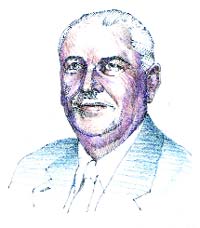
I had been dropped off at the almost new, piano-shaped music building by my parents on a hot Sunday afternoon in July, to register and begin my two weeks at Music Camp. Being that all the doors were locked, I waited, suitcase and violin in hand. After about fifteen minutes, a car pulled up at the curb, and the lone occupant emerged, a stocky, graying, middle-aged man dressed in a suit and tie. He asked me if I was waiting for someone. I replied, "No, I'm waiting to register for music camp." The gentleman never bothered to introduce himself, and I didn't ask. He asked if I wanted to hear the bells. "But what about my suitcase and violin?" I asked. "Just put them in the back seat," he said. With that we got into the car and drove to the rear of Main Hall. The gentleman unlocked the door and we began our climb up the well-worn, steep, creaky and dusty stairs to the bell tower. Sometime during the arduous climb, past dirt-encrusted and bug-splattered windows, periodically checking out the view of the Oval, I realized that I was about to witness a carillon concert, up close and personal, a situation not too many people have experienced. The man took off his suit coat, arranged his music, and began to play. The "keyboard" consisted of two tiers of handles approximately the diameter of broomsticks and about eight inches long, one tier for the "white keys" and the other tier for the "black keys." Each handle had to be grasped and depressed to move the bell clapper since the bells are stationary. I felt like Quasimodo in "The Hunchback of Notre Dame," hearing the deafening din of bells six feet above my head. The concert lasted about fifteen minutes. The only song I remember was the state song, M-O-N-T-A-N-A. I saw the gentleman once again during my stay at the University, at the final concert. Meeting my parents in the foyer of the Music Recital Hall and telling them of my carillon experience two weeks earlier, I saw him milling around the crowd. I said, "That's him. He's the one who played the bells." My mother said, "Don't you know who that is? Why, that's Dean Luther Richman." "Who's Dean Luther Richman?" I asked, thinking that Dean was his first name. "He's the head of the School of Music," my mother replied. Forty-four years later, every time I hear church bells or even the "Westminster" chimes of a grandfather clock, I'm reminded of that glorious half hour spent with Luther Richman as he played the carillon on the UM campus. Richard Hugo, English by Donna Miller M.A. '93, Chinook 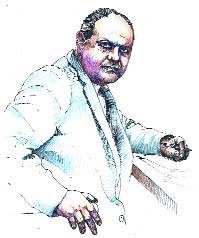
I so admired Richard Hugo's passion for language, that I recorded many of his wise words for future reading. My favorite Hugo quote was: "Poetry is being in love with your own responses to things." For Richard Hugo, teaching was an act of love; I take that passion to my own teaching job, a job that I agree with Hugo has the paradoxical power to both "depress and elate." I was substitute teaching at Chinook High School in October of 1982 when a student brought a clipping telling of Hugo's death. I choked on my tears and quickly explained to the class this was a friend, and subsequently wrote this poem: Upon the Death of a FriendI first met you with a hello in rasping, rheumy voice from forty three stairs and failing lungs. Your greeting was gold. Fat and writing, you would sit with pen in hand, orange glimmer of firefly on your bald head. With color and cajoling, you criticized to teach. My heart was in my ears when I heard the swan. From the shadows, a gray wolf came into sight, a dew drop glazing an eyelash. I feel empty, and frown to conceal unpublic tears. My eyes following the thin gray form, and when you look back, I will be waving. Fred Shafizadeh, chemistry by Ronald S. Wickline '79, Roseburg, Oregon When I enrolled in the forestry school in the fall of 1975, I was told I would need to take at least one full year of basic chemistry. I struggled through CHEM 101 (got a C), then on to CHEM 102 (another C). Part of the reason I didn't "get it" was with me, and part of it was because of professors I just didn't understand or relate to. Then came CHEM 103 and Professor Fred Shafizadeh. He turned on the light as to why the world goes 'round. We dealt with strictly the "science" behind life and its reasons for existence. We never talked of spirituality or its relationship with science; he left that for me to figure out on my own (which I did). Fred looked the part of the deep-thinking scientist — a ring of hair around his head sticking out in all directions, glasses sliding down his nose. He would always raise an eyebrow at me and say, "Understand now, my friend?" I took every class he taught at UM, and yes, I finally understood. A lot of it is about covalent bonds and Krebs' cycles, but a lot of it also goes beyond that. Fred Shafizadeh taught me both sides of the story. Leslie Fiedler, English by Ruth Carrington '51, M.A. '67, Hysham 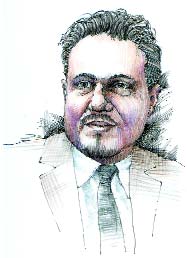
After seven years of overseas teaching, my husband and I took our own sabbatical and entered the world of graduate study. I asked other mature students for advice on professors. They always mentioned Leslie Fiedler and either raved about him (formidable!), scorned him (shocking, what he says in his essay about Huckleberry Finn!) or avoided his classes (never gives A's, humiliates students). Intrigued, I read some of his essays, then a novel, then his classic Love and Death in the American Novel. I decided I must take his class in literary criticism. It was the depth of his experience of literature and his air of seriousness about it that made me decide to learn everything I could from him. When he mentioned casually that he'd be teaching a course in poetry, I told him I wanted to take it, as well as all three quarters of his classes in literary criticism. He laughed and said, "You'll end up with a degree in Fiedler." Never — since my Shakespeare classes at San Diego State College — had a teacher challenged my mind as he did. I respected the variety and vast expanse of his knowledge — of psychology, languages, literature and people. His calm, intuitive, reflective mind and his air of objectivity suggested the mystery of a down-to-earth Buddha. His uncompromising standards for study and writing left me with a continuing passion for learning, grateful that I had chosen literature as my world. After receiving my master's degree from UM, I continued to study, to read and to pursue courses that led to a doctorate in literature, to teaching on a higher level, and to a Fulbright lectureship at the University of Peradeniya in Sri Lanka. Leslie Fiedler's example of scholarship represented the highest ideal of what a university can offer.
Verne Dusenberry, anthropology by James Schaefer '66, Schenectady, New York In the fall of 1964 I had a rude awakening. My Trails End [bar] experiences were catching up with me. Dean Ross of the School of Forestry called me in. We had a chat about the terrible grades I was getting, mainly D's and F's, in courses that should have been cakewalks. He advised me that I was on probation and I was to take a quarter break from forestry. He suggested I enroll in some "cross-campus" courses, ostensibly to raise my grade-point average. With mixed feelings I scanned the course catalog. One course jumped off the page. It was Native American something-or-other, a 400-level course with Professor Verne Dusenberry. Ah hah!, I thought. This sounds easy. The small class met for the first time that quarter in a social science classroom, during which I learned that we were expected to spend between six and eight hours each week in an off-campus house, Professor Dusenberry's home, participating in an interactive class with five, sometimes seven, Salish-speaking Native Americans. We were expected to arrive with a notebook, a sharp pencil and a willingness to listen and eventually transcribe phonetic, morphophonemic and related linguistic nuances of spoken Flathead Salish. Yipes! I pressed onward. The setting was a comfortable five-room home off Gerald Avenue. There was no furniture — only rugs and pillows. There was always a warm fire burning in the fireplace and a thick, sweet, aromatic smoke permeating the rooms. There were few formalities. We sat against the wall and listened as Verne engaged the elders in a probing conversation about the "heyday" of their community. Fluent in the difficult sounds that shaped the casual conversation, Verne eased us into a method of recording and imitating the myriad sounds we heard. Ever patient, he would scold his native guests when they (often) chuckled at our stumbling attempts to speak Salish. After six weeks we were gaining confidence in our linguistic and anthropologic skills. Several of my fellow students, mostly senior anthropology and sociology majors, had begun to develop the same thirst for these interactions with the Salish elders. It was a more fulfilling thirst than I had experienced at the Trails. Dusenberry's Native American something-or-other filled a void in my life. I quickly switched my major to anthropology. I finished my master's and doctoral degrees in anthropology at SUNY Buffalo and returned to teach anthropology at UM from 1969 to 1978. After a Fulbright to India and an NIH postdoc at the University of North Carolina Medical School, I became a senior administrator at the University of Minnesota. I have now returned to my native upstate New York, where I run a consulting business on alcohol and gambling problems and affiliate as research professor of anthropology at Union College. There I teach classes on Native American something-or-other and try to stimulate students, Dusenberry style. Father John B. Wang, Spanish by Michael Oke '65, M.A. '70, Caldwell, Idaho 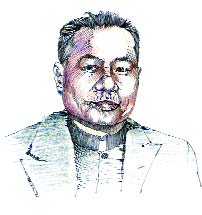
One of my favorite professors at UM was Father John B. Wang. Besides the love of Spanish, we found that we had a common love for tennis. Our tennis rivalry was friendly but intense. We were closely matched, but he seemed to win more of the big points. With his ever-present good humor and smile, he was unflappable. At certain crucial points in the match he would glance briefly heavenward. I'm not a Catholic, but it sure seemed then that Father Wang had a little extra help to win those points. When it came time to defend my master's thesis, he was on the committee and, of all its members, asked the most challenging and incisive questions. Finally, just before the defense was ending, he said to me (in Spanish), "Mike, you defend yourself even with your fingernails." I knew then that I had finally won a hard-fought point and the admiration of a friend and mentor. Nan Carpenter, English by Lois Waterman '52, Newport, Washington 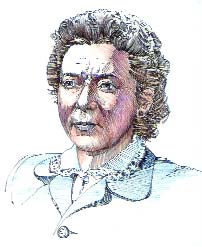
I was startled to discover that as an accounting major, I could not come up with the name of any of my instructors. However, the name Nan Carpenter comes to my mind very easily. She represented my short visit to the literary world. Due to an enthusiastic high school English teacher, I decided to enroll in a Shakespeare class. Nan was the teacher. She was rather small in stature and had a physical handicap that required the use of a walking stick of sorts. Once in the classroom you became unaware of its presence or of her problem. She was astonished to discover that I was an immigrant from the School of Business and thought I was a lost soul. The first exam we had was a real shock to me. It was delivered on a piece of paper about two inches high. There were four questions. One of these was, "Explain the significance of the strawberry handkerchief." The next opportunity to take a class from Nan was on Milton. I'd never heard of Milton and was soon to discover that I was way out of my league. There were four of us in the class — the other three all English majors. One student had read "Paradise Lost" twelve times and I'd never heard of it. Nan did her best to convey the literary times of Milton. I was to work harder for that three-credit course than I thought possible, only to get a C-. Nan was being compassionate; a D would have been more realistic. Nan Carpenter was highly intelligent, warm, humorous and a delight; but I had the presence of mind not to take any more classes from her lest my day of graduation become a question. Now I have the best of two worlds: I do the accounting for a county library and am also involved in the world of books. Nan would be pleased that I'm not totally lost to the world of figures. Joseph Epes Brown, religious studies, & Jules Karlin, history by Ira Lax '83, Ann Arbor, Michigan 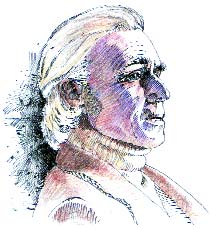
Joseph Epes Brown and Jules Karlin had as many similarities inside the classroom as they had differences outside. Joseph's passions beyond the ivy walls were Islamic and Native American art and raising appaloosa horses and bison. Jules' were newspaper clipping and tennis. Besides teaching, I only saw him on University tennis courts, serving and chasing balls in all-white T-shirt, shorts, socks and shoes. Both had Socratic teaching styles; one like a Zen master, the other a raging bull. Joseph had a sparkle in his eyes and a quiet sense of humor; Jules seemed eager to hit you upside the head with his piercing political zingers and jokes. He delighted to see the glow of understanding in your eyes after (or if) you recovered your composure. 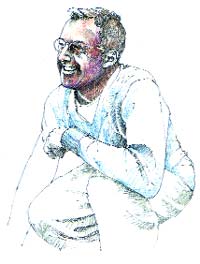
Joseph's classes were full of interesting people, including Native Americans from all over the West. We read wonderful books, mainly about the Southwest and the Great Plains. Classes were held in and around the religious studies house on the edge of campus. Joseph often brought in tribal artifacts to show and talk about: pipes, drums, flutes and articles of clothing. We would sit in a circle on the ground or floor. Dis-cussion would evolve through examining these things, or from a question about the readings. Often discussions took on a dreamlike serenity and time would flow by or drag along, depending on which branch of the ambient river of thought you took. To prepare for Dr. Karlin's U.S. constitutional history class you had to have read "Notes of Debates in the Federal Convention of 1787 Reported by James Madison," relevant Supreme Court cases and all other assigned primary and secondary readings. In class, Karlin was Dickensian in his plotting, peering cleverness. He'd hunch over the table where we all sat nervously and fire questions, challenging us to show how prepared we were — great training for the Marines or a law career. I have no doubt that Karlin's students who became lawyers now write the best arguments in court. More than twenty-five years later, these two professors' different styles of Socratic engagement remain vital and active in my own teaching of alternative high school students in southeast Michigan. These teachers went a long way to challenge and develop the person I was longing to be. Looking back, I find it amazing that so many parts of the country came to learn from each other in this sparsely populated western valley. Beverly Chin, English by Donna Miller, M.A. '93, Chinook 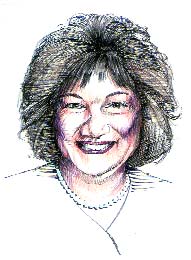
In 1992, after having taught for ten years, I began to experience a degree of professional stagnation. Time to recharge my career with a challenge to reignite my enthusiasm, I thought. So, I enrolled at UM to embark upon another educational journey leading to a master's degree in English. While at UM, I renewed many professional associations, namely a relationship with Beverly Chin. Beverly's remarkable ability to empower others and give them voice proved to be just the kind of energizing my career needed. Sometimes the attitudes and personalities in our own schools, local districts or individual departments infect us with apathy or pessimism. We need to move outside those complacent circles for a cure. Beverly has served as my panacea, renewing my optimism and faith in myself as an effective educator. The educational community can only hope to continue to draw and sustain such dedicated personalities. J.W. Howard, chemistry by Earl Christensen '43, Naples, Florida 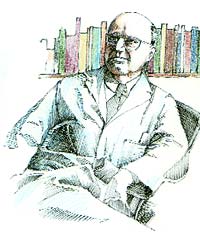
Dr. Howard walked with a brisk step and a bright face, with a cheery greeting to all he met, invariably wearing a gray lab coat over his suit, because the laboratory was his second home. In his spare time he isolated and identified a number of new organic compounds, but that is another story. Dr. Howard's principal course was carbon compounds, a prerequisite for students majoring in the physical sciences. It was a combination of lectures and lab. During the lectures Dr. Howard filled the blackboard repeatedly for two hours with structural formulas, physical properties and chemical equations. I found early on that these had to be copied verbatim and memorized because he finished the week with a one-hour written quiz covering the week's instruction. Almost four years later, after World War II, I was hired as a patent examiner in the U.S. Patent Office and still remembered enough of my organic chemistry to be assigned to the Organic Chemistry Division. All this is preliminary to what I really want to relate, which was the extraordinary assistance Dr. Howard provided to his graduating chemistry class in securing employment after graduation. The 1930s and early '40s were the years of the Great Depression; a college degree was no guarantee of a job. To the other professors in the chemistry department this was not a concern, but to Dr. Howard it was. The Class of '43 included almost a dozen chemistry majors, a record for those days, and he felt duty-bound to place every one of us. Two of these had ROTC commissions, so the Army took care of them. The others were a chore. I well remember Dr. Howard bringing classmate Leonard Smith ("Smitty") and me to the Great Northern Depot on an overcast gray, chilly Sunday afternoon in order to meet briefly with a faculty member of the Institute of Paper Chemistry in Wisconsin who was en route by train to the West Coast, with a brief stop in Missoula; by pre-arrangement, the four of us got together in the waiting room for a few minutes. I don't know that anything came of it. Dr. Howard eventually found Smitty a teaching assistantship at the University of Illinois; there he earned his master's and doctoral degrees, joined the faculty, and taught chemistry for thirty-five years. Dr. Howard also arranged, somehow, for a recruiter from the Naval Research Laboratory in Washington, D.C., to stop in at the University. We all applied for a job, and two of us were accepted — Francis Pott and me. I remember that when I showed Dr. Howard my job offer — $1.05/hr for a 48-hour week — he said, Gee, he had his Ph.D. and taught ten years before he made that much money. Sister Madeleine DeFrees, English by Kathie Jenni '76, Orange, California 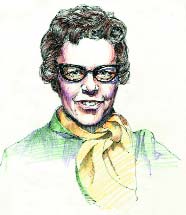
Madeleine DeFrees was not one of my favorite professors, but she taught me something about poetry. Having fancied myself a poet since the first grade, I wrote a ridiculously sentimental love poem for my first assignment. To my breathless delight, DeFrees opened one session by reading my poem, with far more dignity and eloquence than it deserved. There was a stunned silence on the part of my equally inexperienced peers; then a friendly fellow inquired reverently: "Did you write that, Professor DeFrees?" My head was spinning with pleasure until she replied: "There's not a line in this poem that I would have written." She hadn't revealed my identity, but she had hurt me deeply. Nevertheless, I was a quick study. My next poem was a verbal snapshot of a rabbit getting caught in a steel-jawed leghold trap: vivid sounds and images. She praised it highly, but even if she hadn't, I'd have known: It was a thousand times better. This episode taught me the importance of disciplined passion. Henry G. Bugbee, Jr., philosophy by Michael Palmer '76, M.A. '77 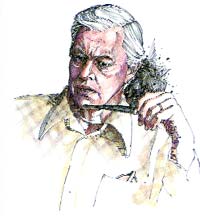
There are people whose contribution to some aspect of your development is so great or whose impact on your life is so decisive that you can say, "I owe my life to that person." These words aptly describe my relationship with Henry Bugbee. For more than a quarter of a century he was my mentor, confidant and friend. At the outset of our relationship, he invited me to embark on what he called "an exploratory venture in reflective thought." Along the way, he helped me see that, although we are born human, humanity in its fullness is something to be achieved. He instructed me in the meaning and responsibility of being a teacher. I first met Henry in the early months of 1973 in a philosophy of religion course taught by John Lawry. On sabbatical that year, Henry was auditing John's course. With his silvery hair, bronze complexion and tall lean figure, he was a mysterious and somewhat commanding presence in the room. I remember him wearing a grey-and-white long-sleeved flannel shirt, cotton pants and mountain boots. In those days, he smoked a pipe, too. He didn't speak often, but when he did, he left a deep impression on me and the other undergraduates in the class. His sentences, with their complex vocabulary and multiple subordinate clauses, undulated and were choreographed with Henry's constant hand gestures and changing facial expressions. In speech and mannerism, he seemed at once fascinating and mysterious. But something else particularly intrigued me about the way Henry presented himself. As an authoritative figure among us novice undergraduates, he could easily have impressed us with grand affirmative pronouncements. Instead, he usually either asked questions or offered carefully crafted alternative lines of response to his own or others' questions as they emerged in the context of the themes under discussion. His questions were not rhetorical, and his arguments were not impersonal. There was something vital and deeply exploratory about everything he said. What distinguished him was his deep and abiding commitment to making the educational process successful. Later, taking graduate courses with him and serving as his teaching assistant for two years, I came to a much fuller realization that Henry's practice of carefully attending to the questions was not simply a pedagogical style but rather a fundamental expression of his life. So it did not surprise me to discover that the year-long study culminated with a selection of letters from the German poet Rainer Maria Rilke to a young aspiring poet, Franz Kappus. In the letters, Rilke responded to Kappus' request for advice on numerous questions, especially ones about his poetic ability and his own unmade future. In one of the letters, dated July 16, 1903, Rilke spoke candidly to the young poet. His words might well have been Henry's to the students in his charge who, after a year of reading and journal writing, felt ready for some answers to the big questions. You are so young, so before all beginning, and I want to beg you, as much as I can, dear sir, to be patient toward all that is unsolved in your heart and to try to love the questions themselves like locked rooms and like books that are written in a very foreign tongue. Do not now seek the answers, which cannot be given you because you would not be able to live them. And the point is, to live everything. Live the questions now. Perhaps you will then gradually, without noticing it, live along some distant day into the answers. By word and example, Henry taught me to love the questions. AROUND THE OVAL• SPORTS • CLASS NOTES • ALUMNI NOTES FEEDBACK•STAFF • ABOUT THE MONTANAN •ARCHIVES HOME • CONTENTS
|